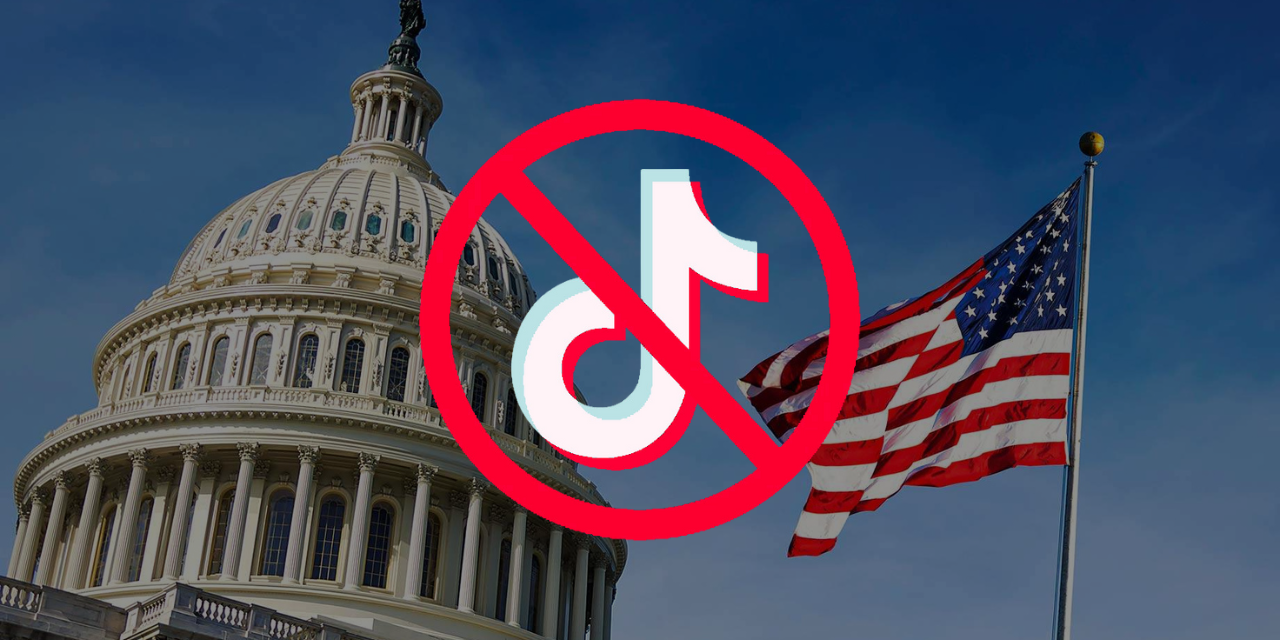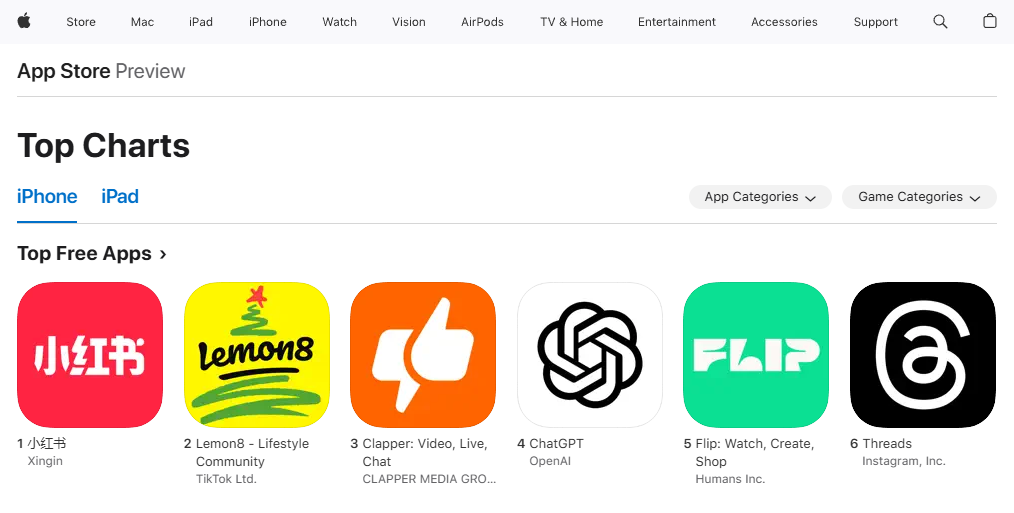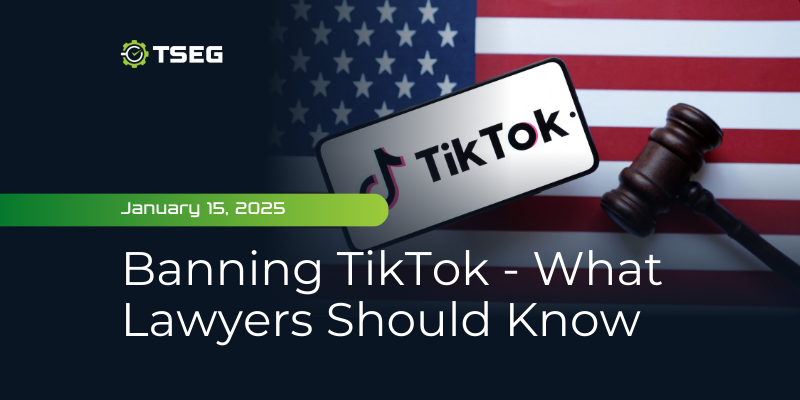Banning TikTok – What Lawyers Should Know
Posted on Wednesday, January 15th, 2025 at 2:24 pm
Update 1/19/2025: The TikTok Ban Has Been Delayed for 75 Days
A Legal Matter of National Security
It’s finally here – the banishment of a social media giant, fueled by escalating concerns over data security and foreign influence. Efforts to ban TikTok have been active at both the executive and legislative levels for months. FCC Commissioner Brendan Carr has described TikTok as a “clear and present danger” to U.S. national security, emphasizing the urgency of addressing these concerns.
However, TikTok’s legal team and advocates for TikTok creators and service providers argue that a ban would set a dangerous precedent for internet freedom and could infringe on First Amendment rights. TikTok and ByteDance are represented by attorney Noel Francisco, who has argued some of the most important cases the Supreme Court has heard in recent years. TikTok’s legal team is working closely with Jeffrey Fisher, one of the nation’s leading Supreme Court practitioners and scholars, who represents creators who rely on the platform for their livelihoods.
This lawsuit points out the complex intersection of national security, legal considerations, and digital expression in the modern era.
Read more on the details of the ban in our blog post: How attorneys can prepare for a TikTok-free world, and Trump’s TikTok Reversal.
Will TikTok Be Banned? Experts Weigh In
The debate over TikTok’s future in the United States is framed by two opposing arguments: the government’s claim that the app is a security risk and TikTok’s defense that a ban would infringe on free speech. On January 20th, 2025, President Trump signed an executive order that delays the TikTok ban by 75 days.
The Government’s Stance
The U.S. government has argued that TikTok’s ownership by ByteDance, a Chinese-based company, poses a serious national security risk. Lawmakers worry that ByteDance could be forced by the Chinese government to hand over sensitive user data or influence content for political purposes.
Solicitor General Elizabeth Prelogar stated:
“TikTok’s immense data set would give the PRC a powerful tool for harassment, recruitment, and espionage.”
These concerns have led to ongoing efforts to either ban the app outright or compel ByteDance to divest its U.S. operations.
TikTok’s Defense
TikTok’s legal team has pushed back, arguing that banning the platform would violate the First Amendment. The company asserts that no evidence supports claims that it has mishandled data or poses a genuine security threat.
Attorney Noel Francisco equated TikTok’s algorithm to the process of editorial decision-making, arguing that it constitutes a form of protected speech. He said:
“The government’s real target, rather, is the speech itself…There is no evidence that TikTok has engaged in covert content manipulation in this country.”
TikTok has implemented significant safeguards, including storing U.S. user data on servers within the United States, to counter these allegations. They maintain that targeting TikTok is an overreach of government authority and unjustly singles out the platform.

The Impact Post-Ban
The impact of a TikTok ban will be felt by users, creators and the broader social media ecosystem.
Immediate Effects
Following a ban, TikTok will be removed from app stores like Google Play and Apple’s App Store. This removal blocks new downloads and prevents app updates for current users. While those who already have the app installed would still be able to use it, the lack of updates would gradually cause the app to lose functionality as it becomes incompatible with newer updates and devices.
Increased Risks for Users
Those who choose to keep the app on their devices might also face potential security risks. Forbes recently outlined that many users are sharing personal data with the app such as location, their contacts, photo albums, and access to the camera and microphone. Ultimately, it’s encouraged that users block this level of access and to set up two factor authorization to secure your account with your phone number, ensuring no one can access your account without it.
A Slow Fade
Without regular updates, new security vulnerabilities may leave the app open to exploitation. Over time, these risks could outweigh the benefits of continuing to use the platform. Users may begin transitioning to other platforms like Instagram Reels or YouTube Shorts, which offer similar features.
How TikTok Users Are Reacting
Many users will likely continue using the app for as long as it remains functional. With 170 million U.S. users, TikTok has become a central platform for communication, entertainment, research, and even income generation. Most people won’t abandon the app immediately, especially if it still works on their devices. However, the TikTok app will gradually lose functionality and security, which will eventually push users to explore other options.
As TikTok becomes less reliable, U.S.-based platforms like Instagram Reels and YouTube Shorts are expected to see a sharp increase in user activity. Both platforms already offer features similar to TikTok, making them the most likely destinations for those looking to maintain their online presence. Newer platforms could also emerge during this transition, capturing users eager to find the next big thing.
As of this blog post, the Chinese-owned app that emulates TikTok, RedNote, has skyrocketed to the #1 app on the App Store. This timely hijacking of youth culture could remain a threat to the personal data younger people unknowingly share with foreign companies. Perhaps one of the last TikTok trends, this digital “refugee” migration appears to be an act of solidarity against the app’s defense that the ban is an attack on free speech.

Law firms targeting younger audiences should prepare now by optimizing content on Instagram and YouTube to remain visible to this demographic. Proactively shifting marketing efforts to platforms where Gen Z and Millennials are active ensures that law firms won’t miss out on potential clients.
For detailed strategies, TSEG’s blog on engaging Gen Z through social media offers valuable insights into adapting to these changes.
Preparing for the TikTok Aftermath
The potential TikTok ban represents a pivotal moment for users, businesses, marketers who rely on the platform to connect with their audiences. Law firms, in particular, should see this as an opportunity to reevaluate and diversify their digital marketing strategies to avoid being caught off guard by such disruptions.
For firms that have used TikTok as a tool to engage with younger audiences, the key is to prepare for a seamless transition to other platforms. Instagram Reels, YouTube Shorts, and even newer social media apps will likely become the primary destinations for displaced users. Ensuring that your content is optimized for these platforms will help maintain visibility and engagement with potential clients. Additionally, search-focused strategies must take into account the increasing role of social media as search engines for younger generations.
For more on this trend, TSEG’s blog on social search offers actionable guidance.
While TikTok’s fate remains uncertain, what is certain is the importance of adaptability in digital marketing. By taking proactive steps now, law firms can continue to attract and connect with clients even in a rapidly shifting social media environment. Partner with TSEG today.
